Nursing Your Baby and Newborn Care

Every mum should breast feed her newborn for the following reasons:
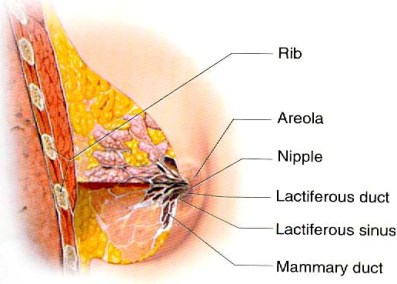
- Breast milk is the best to ensure the health of your Baby.
- It is the safest method for Mother and Baby.
- Provides the Baby with a fresh, easy, digestible meal.
- Provides the Baby with immunity against diseases.
- Strengthens the bond between the Mother and her child.
- Always available.
- Decrease the potential for contracting allergies.
- Easy to provide anytime, no need to clean bottles or to prepare.
- Most babies grow normally during the first 4 months or the first year of life
- Less expensive.
- Most Mothers find pleasure and relief in breastfeeding. We hoping you will agree.
Symptoms that need an immediate visit to your doctor if you notice that your Baby has:
- High or low body temperature.
- Poor feeding, crying, activity.
- Cyanosis.
- Jaundice.
- Paleness.
- Convulsion and abnormal movement.
- Cough dyspnea.
- Vomiting, diarrhea and constipation.
- Bleeding from the site of circumcision or from the umbilicus.
- Care for the umbilicus: you need to clean it with alcohol and wrap it with sterile gauze around the rest of the remnant of the umbilical cord.
- You should visit your doctor after 3 months to check on your Baby’s health, and to examine for the presence of congenital hip dislocation.
- You should give your Baby scheduled vaccines from the second month after birth in order to prevent serious diseases in the future.
Baby’s weight at time of delivery:
There are many factors that affect the Baby’s weight:
- The duration of pregnancy.
- Maternal condition during pregnancy such as blood pressure, diabetes, blood supply to the uterus.
- Genetic factors.
- If both parents are tall the Baby will be tall .if the Mother is diabetic the Baby will be heavier in weight. The average weight at birth is between 2.5-4.5 kg.
How to care for your newborn:
- Changing diapers:
Your Baby’s first day, start with using diapers. The appropriate one will keep skin healthier, and will keep your Baby more satisfied.
The diaper should be made of good absorbent material, and should be comfortable for movements.
- What you need when you want to change your baby’s diapers:
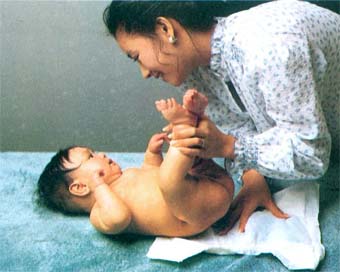
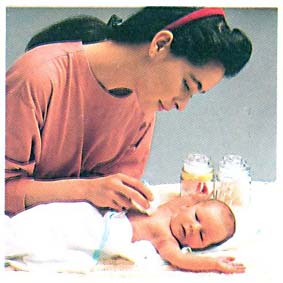
Diaper sheet, diaper, warm water, towels, clean gauze, Baby's body soap, and Baby’s body powder. Put your Baby on a clean towel, remove the wet diaper, and clean the buttocks from the anterior side of the anus, backward especially for female Babies to avoid contamination and infection of the genital area. Once the skin dries, apply a small amount of Baby’s body lotion, then Baby’s body powder in the curves of the skin. If your Baby’s skin is sensitive, you may use Baby oil instead, then wipe the excess using gauze.
How to treat skin irritation (scalding):
- Your Baby’s diaper should always be clean and dry.
- Expose the lower part of your Baby’s body to air especially if the weather is warm.
- Avoid using plastic underwear all the time.
Some symptoms that shouldn’t worry you:
- Sneezing, yawning, and crying.
- Breast bud swelling.
- Vaginal discharge in a female Baby.
- Knee and joint bending.
The sleep of the newborn baby:
- Newborn babies spend most of their time sleeping except when they eat or while wetting their diaper.
- Babies sleep more at night as they grow.
- Some Babies prefer to sleep on their stomach.
- Watch your Baby’s breathing for a while to be sure that there is nothing impeding or closing the airways.
- If your Baby sleeps immediately after feeding, or was sick, watch their breathing more carefully.
Newborn shower:
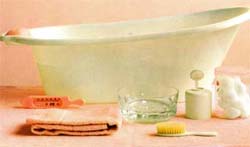
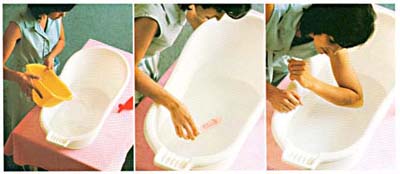
- You can shower your Baby before feeding, or in the morning or before bed time at night in order to have a better sleep.
- In the first 2 weeks before the umbilical cord drops, it is better to shower your Baby with a sponge.
- Before starting the shower, be sure that the room is warm enough, wash your hands carefully, prepare warm water 40c◦ (104f), Baby’s bath, Baby’s shampoo, thermometer, soft towel, Baby’s body shower shampoo, gauze, Baby’s body lotion, Baby’s oil, Baby’s powder, small nail clipper, Baby’s comb, clean diaper and clothes.
1- Bathing with a sponge:
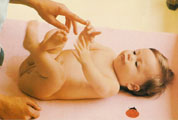
- In the first 2 weeks of your Baby’s life, it is preferred to sponge bathe rather than using a bath tub.
- Put your Baby on a clean towel; wash the eyes, nose, and ears with wet, soft cotton.
When you are cleaning your Baby’s eyes, wipe from inside to the outside of the eye, you can use a wet clean cotton to clean the external part of the nose and ears, but do not try to clean the inner part that you cannot see, as you may harm the soft skin which can cause infection. You may wash the anus with warm water, and then wash the hands, feet and trunk (abdomen).
Use the previously boiled water which will cool to the appropriate room temperature after covering your Baby’s body, wash the hair with shampoo, hold the head and neck with your waist and wash the hair gently with a Baby’s shampoo, then rinse it with water.
2- Bathing:
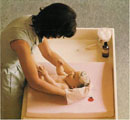
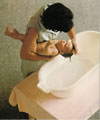
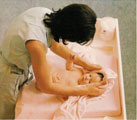
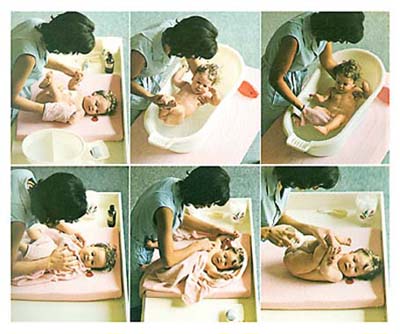
- Fill half of the Baby’s Bath with warm water 40C° (104F°). You may use a thermometer or you may put your elbow in the water and feel its temperature, it should be warm enough so that your Baby will enjoy the bath.
- Put your Baby in the Bath gradually, step by step. Hold the head and neck gently and put the feet in the water. Then wet the hands, wash the trunk (abdomen), anteriorly, then hold your Baby upside down and wash the back.
- Wash the curves of the body carefully and wash the anus.
- Do not leave the Baby alone in the Bath.
- A healthy Baby needs to do exercises such as bending, followed by stretching of the hands and legs. These exercises will increase the metabolism and activate blood circulation.
- To help the child's moving, choose warm, light and comfortable clothes.
- When you change your Baby’s clothes you may turn on calm music or distract with a beautiful doll, till 3 months.
- Keep your hand underneath the head and neck to support them.
- If the weather is warm, expose your Baby to sun, in order to stimulate Vitamin A production. But be sure that the sun is light and gentle. Do not expose your Baby to direct sun as this will burn sensitive skin. This is important for the Mother too.
Breast feeding:
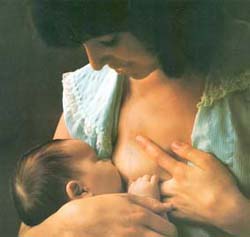
- Breast milk is the best milk for feeding your Baby in order to grow healthy. It contains immunoglobulins which defend against infections.
- It is also important for strengthening the bond and building self-confidence in the maternal child.
- It also helps the Mother to recover quickly. When the Baby sucks the nipple, this stimulates uterine contractions as with other uterotonic medication.
- Even if you are in a position to choose between breast feeding your Baby or milk, choose the one that has a close composition to breast milk.
How to breast feed your baby:
- You should be in the most comfortable position you can find when you are breast feeding your Baby.
- You may prefer that your Baby is beside you in the first few weeks, but then you will prefer breast feeding while you are sitting.
- Before breast feeding your Baby, you need to wash your breast with warm water. Do not use soap as your Baby may ingest it.
- Breast feed your Baby from one breast for 10 minutes then on the other breast for another 10 minutes. You may put a safety pin on the side that you breast fed from in order to remember, from which one you beast fed last.
- Actually, the Baby will have enough milk from the first breast, but in order to stimulate both breasts to produce equal amount of milk, both should be used.
- You may notice that your Baby finds difficultly in holding your large nipple. Although your baby knows how to suck, you need to hold your nipple between your index and middle fingers and put it inside your Baby's mouth. Be sure that your Baby is holding not only your nipple but also your areola. Direct your areola downward to stimulate more milk production and to protect your Baby from choking.
- Feed your Baby for 20 minutes each time.
- To release the nipple, put your finger between your Baby’s mouth, and the breast. If your Baby has had enough, they will release your nipple, naturally.
- Let your Baby eructate, (belch or burp), during feeding and after breast feeding.
- Allow your Baby to relax over your shoulder. Put a towel over your shoulder as your Baby may vomit on you.
- You may weigh your Baby once a week in order to check progress.
- After breast feeding, wash your nipples with warm water and allow them to dry.
- Put two pieces of cotton inside your bra in order to absorb leaking milk.
- If your nipple cracks, you can use cream or a moisturizer containing vitamin A.
Breast feeding schedule:
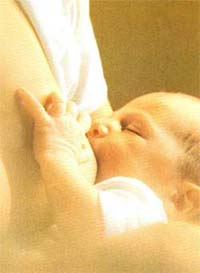
- You need to set a schedule that fits your Baby’s needs.
- In the first week, your Baby needs a feeding every 2 to 3 hours, even at night.
- After 1 to 2 months, your Baby needs a feeding every 4 hours (5 times/day), and your breast will meet these needs.
Milk production:
- In the first few days, your breast will produce milk spontaneously, which is called colostrum, and it is highly concentrated yellow milk, rich in immunoglobulin’s, which stimulates the Baby’s bowel to get rid of meconium.
- After that, milk will be whiter and increase in quantity as your Baby sucks it more.
- As you are breast feeding your Baby, you need to limit your consumption of coffee and tea up to 2 to 3 cups/day. Do not drink alcohol and avoid smoking.
- Do not take any medication before consulting your doctor as it may be secreted in your milk and by that, reach your Baby.
- Clean your breast and nipple to avoid mastitis.
- In order to secrete more milk, drink a lot of water, herbal tea, milk and juice with balanced food.
- Avoid eating beans and cabbage, because they may cause you gas.
- Eat fruits and vegetables and a high protein diet.
- Breast feeding is not an activity only. It also gives you a lovely relationship with your Baby that you will not forget.
How to prepare a bottle of milk?
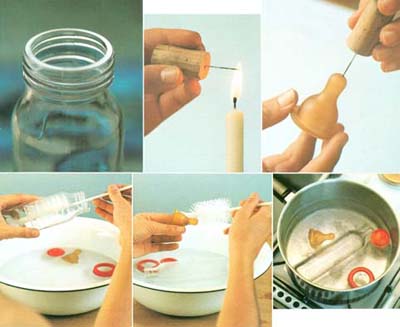
- You need to clean all the bottles, bottle covers and tubes correctly and sanitize them before each meal as food can easily contaminate them with bacteria. Be careful when you prepare your Baby’s bottles.
- Please follow these instructions:
- Wash your hands with water and soap before preparing the meal for your Baby.
- Boil an amount of water in a clean pot.
- Wash all the bottles, its covers and tubes with water and soap using a special brush, then rinse them with cold water, till all the soap has been washed away.
- Then put all of them in boiled water and let it boils for 10 minutes at least.
- After 10 minutes remove all the tools using clean forceps and put them on a clean board till they are dry. Place the bottles upside down so that all the water may drain properly.
- Then boil some drinking water in a clean container and let it boils for 5 minutes.
- Then pour it in the bottles, and let it cool to 50C°.
- Put in the proper amount of milk as your doctor informs you.
- Close the bottle with its cover.
- Shake the bottle till the powders melt completely.
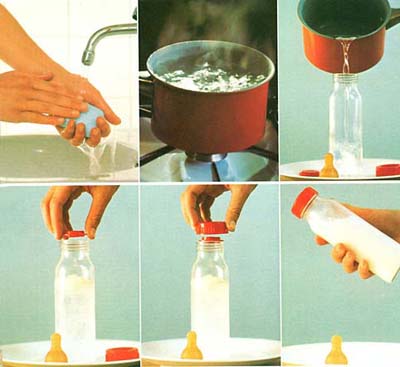
- Put the nipple on the bottle without touching the part that will be inserted into the Baby’s mouth, then let it cool until reaching the drinking water temperature.
- The temperature of the bottle should be the same as the body temperature once feeding your Baby 35-37C°, not cooler, nor hotter, check the temperature of the bottle on your cheek till you are satisfied of the correct temperature, or put a drop of milk on the back of your hand till you feel it has the right temperature, then it is ready for your Baby.
Caring for the newborn:
1- Crying:
It is the only way that your Baby can express needs. Most of the time, it will be to change his diaper, or your Baby is hungry, thirsty, or uncomfortable, or needs to be carried. After a while, you will know what your Baby needs.
2 - Differences between babies:
- Every child has a special reaction, and it almost always is affected by:
1 - Body growth.
2 - Genetic material.
3 - Surrounding environment.
- The Baby’s recognition of the surrounding environment is different from one Baby to another and it almost reaches 280 days.
- The Baby can grow every day in the uterus, so within a few days will begin to grow rapidly.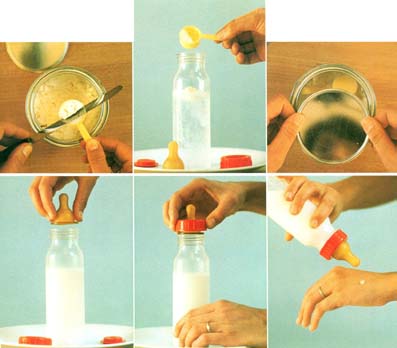
- The Baby’s reaction to their surrounding environment is complex, and differs according to the different circumstances exposed to.
- Some babies are calm and funny. Some are distempered and do not sleep well. Others are active and sensitive so you cannot compare your Baby with others. Instead, you should admit that your Baby is very special, has unique features. Do not hesitate to express your love and care for your Baby, and after a while they will grow healthy.
3- Family role:
For the newborn, the new home is exciting. Your Baby sees the Sun and hears different voices, the touch of clothes over the body and the feeling of the hard floor while walking over it.
The feeling of the air entering the nose, all these things make your Baby unable to deal with them all at once. Your Baby needs your care and love.
Your Baby needs both parents to react with and to care about them more and more.
Once Your Baby feels your love, they will feel satisfied and safe and grow healthy more and more.
Baby Names Book, Arabic Baby Names
http://www.babynamesbook.net
Dr Najeeb Layyous F.R.C.O.G
Consultant Obstetrician, Gynecologist and Infertility Specialist







 Pregnancy Due Date Calculator
Pregnancy Due Date Calculator
 Chinese Gender Predictor
Chinese Gender Predictor
 Ovulation Calculator
Ovulation Calculator
 IVF Due Date Calculator
IVF Due Date Calculator
